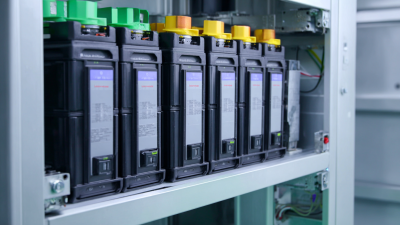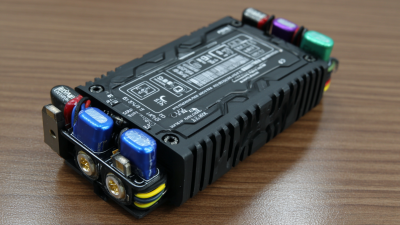 +86-13928815851
+86-13928815851
Leave Your Message
-
 CONTACT NUMBER
CONTACT NUMBER -
 CONTACT NUMBER
CONTACT NUMBER -
 CONTACT NUMBER
CONTACT NUMBER



Lithium batteries have revolutionized the way we power our devices and vehicles, offering a multitude of advantages that go far beyond conventional battery technologies. As technology continues to evolve, it’s essential to understand the incredible benefits that lithium batteries bring to the table, particularly in terms of energy efficiency, longevity, and environmental impact. In this article, we will explore seven remarkable advantages of lithium batteries that you may not have known about, highlighting their significance in today's fast-paced, tech-driven world. From their superior energy density to their lightweight design, lithium batteries are not just a trend; they are a pivotal innovation that promises to change how we harness energy in our everyday lives. Get ready to discover why lithium batteries are the backbone of modern technology and how they can enhance various applications, making them an indispensable choice for consumers and industries alike.

Lithium batteries have gained significant attention not just for their performance but also for their environmental advantages. According to a report from the International Energy Agency (IEA), lithium-ion batteries can reduce greenhouse gas emissions by up to 80% compared to traditional lead-acid batteries when used in electric vehicles (EVs). This substantial decrease is primarily due to their higher energy density and efficiency, which allow for longer driving ranges and less frequent charging, ultimately leading to a reduction in carbon footprint.
Moreover, lithium batteries are more sustainable in their lifecycle management. A study published in the Journal of Cleaner Production highlights that the recycling rates of lithium-ion batteries can reach up to 90%, allowing valuable materials like lithium, cobalt, and nickel to be recovered and reused. This not only minimizes the demand for raw materials, reducing the impact of mining on ecosystems but also encourages a circular economy. As consumer awareness grows, the switch to lithium batteries becomes a pivotal move towards a cleaner, more sustainable future in everyday technology, from smartphones to renewable energy storage systems.
Lithium batteries have transformed the landscape of modern electronics, significantly enhancing device performance and longevity. One of the most notable advantages of lithium batteries is their high energy density. This characteristic allows devices to operate longer on a single charge compared to traditional batteries, minimizing downtime and making them ideal for everything from smartphones to electric vehicles. As a result, users can enjoy extended usage without the constant need to recharge, ultimately improving productivity and convenience.
Additionally, lithium batteries exhibit a much lower self-discharge rate than other battery types, enabling devices to retain their charge longer when not in use. This feature is particularly beneficial for devices that are utilized sporadically or during emergencies. Furthermore, lithium batteries are known for their impressive cycle life, meaning they can endure many charge and discharge cycles without significantly degrading their performance. This longevity not only reduces the frequency of replacements needed but also contributes to more sustainable consumer practices by decreasing electronic waste. Thus, integrating lithium batteries into devices not only enhances their immediate performance but also promotes a longer lifespan, benefiting users and the environment alike.
 Lithium batteries have become increasingly popular due to their cost-effectiveness compared to traditional battery types such as lead-acid and nickel-cadmium. According to a report by Bloomberg New Energy Finance, the average price of lithium-ion batteries has dropped by about 89% since 2010, making them significantly more accessible for various applications, from consumer electronics to electric vehicles. This reduction in cost not only contributes to the growing adoption of renewable energy solutions, but it also leads to lower lifetime costs for consumers and businesses alike.
Lithium batteries have become increasingly popular due to their cost-effectiveness compared to traditional battery types such as lead-acid and nickel-cadmium. According to a report by Bloomberg New Energy Finance, the average price of lithium-ion batteries has dropped by about 89% since 2010, making them significantly more accessible for various applications, from consumer electronics to electric vehicles. This reduction in cost not only contributes to the growing adoption of renewable energy solutions, but it also leads to lower lifetime costs for consumers and businesses alike.
In addition to upfront savings, lithium batteries offer a longer lifespan, further enhancing their cost-effectiveness. Industry data from the International Energy Agency indicates that lithium-ion batteries can last from 8 to 15 years, often outlasting traditional batteries that may require replacement every few years. This longevity, combined with their high energy density, results in fewer replacements and maintenance costs over time. Thus, businesses and consumers looking to invest in battery technology can find considerable value in choosing lithium batteries, making them a sound economic choice in the long run.
Lithium batteries, particularly lithium-ion types, are heralded for their remarkable safety and stability features that are continuously improving through technological advancements. Recent studies show that innovations in solid-state electrolytes (SSEs) are crucial for enhancing the safety of lithium batteries. These developments focus on mitigating the risks associated with traditional liquid electrolytes, which can be flammable and pose thermal runaway challenges. By addressing failure mechanisms within solid-state systems, researchers are paving the way for safer energy storage solutions that not only minimize hazards but also boost overall energy density.
Tip: Always ensure that your lithium batteries are manufactured with advanced solid-state technology to benefit from improved safety features, particularly if you're using them in devices with high energy demands.
Moreover, the exploration of high-performance lithium titanate anodes highlights the significance of materials that exhibit excellent thermal stability and charge/discharge characteristics. Data-driven research into battery cycling stability shows that innovations like the design of a new class of Hofmann complexes could lead to enhanced lithium-ion conduction, ensuring longer-lasting battery performance without compromising safety. As the demand for lithium batteries grows, awareness of these advanced safety features can guide users towards smarter choices in energy storage.
Tip: When selecting lithium batteries, check for features like high thermal stability and low flammability ratings to ensure you are choosing reliable and safe options for your needs.

The future of lithium batteries is being shaped by groundbreaking innovations and emerging trends that are transforming various industries. As electric vehicles (EVs) gain traction, there's a notable shift toward advanced battery technologies, particularly lithium-ion batteries. At recent forums focusing on future energy solutions, experts highlighted developments such as increased energy density, improved safety features, and more sustainable recycling processes that are key to meeting consumer demands.
Furthermore, with the rising popularity of electric mobility, the market is witnessing a surge in research and development aimed at enhancing battery performance and reducing reliance on non-renewable resources. For instance, the transition from cobalt-based to lithium iron phosphate batteries is gaining momentum, offering cost-effective alternatives without compromising efficiency.
These advancements are not only aligning with global sustainability goals but are also essential in driving the evolution of the energy sector, ensuring that lithium batteries remain at the forefront of technological progress.






